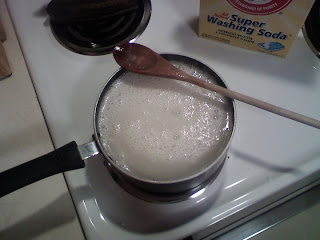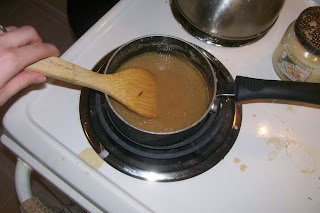The Dishwasher is quite possibly the most incredible kitchen appliance to ever have been invented. Know what else? I'd bet money that it was created by a Homemaker...or at least someone with children. My MIL (that's internet lingo for Mother In Law, incase ya didn't know) is 1 of 11; yes, ELEVEN children. Can you imagine cleaning up dinner dishes for that family? My husband's grandmother is a Saint, seriously. Me? Not likely to be cannonized anytime soon. The dishwasher keeps me sane. Pop in the grimey dishes at naptime and sit down with a cup of coffee and let the swishing sound of water and electronic brilliance doing your dirty work relax and sooth you. 45 Minutes later- VOILA! Someday somebody will invent something that loads and unloads that machine...mark my words. However one thing that isn't likely to be replaced anytime soon is Dishwasher Detergent. I personally have a problem with this. It's expensive and bad for the environment. So, yep, you guessed it. I'm going to "Stick it to the Man" as they say, and make my own :).
There are many recipes out there for Homemade Dishwasher Detergent...and I've tried many of them. I've had some pretty cruddy results with some of them and I've finally come to find one that works even better than my preferred store bought Palmolive Eco brand. Here's what you'll need:
Ingredients from Left to Right:
Citric Acid- This can be bought in most health food stores (Wegmans, for all you New Yorkers!). I buy it online because it's cheaper to buy in bulk. This prevents a cloudy residue from forming on your glasswear. Some people say you can substitude with 10-15 packages of Lemon KoolAid (the unsweatened kind in those small envelopes) but I haven't had much success with this. I got a cloudy film when I tried the substitute but some people swear by it!
Arm & Hammer Washing Soda: Not to be confused with BAKING Soda. Can be found in the Laundry section of the grocery store. Usually it's on the shelf near the Oxy Clean. You can also find this online if your local grocer doesn't carry it.
Borax: Also found in laundry section near Oxy Clean & can be bought online if necessary.
Kosher Salt: I'm thinking you can probably figure this one out on your own...
Recipe: 1 Cup Borax, 1 Cup Washing Soda, 1/4 Cup Citric Acid, 1/4 Cup Kosher Salt, Clean Dry 32 oz container (Ex: Empty Mayo jar, Empty Yogurt Container...)
Add 1 Cup of Borax
Add 1 Cup Washing Soda

Add 1/4 Cup Citric Acid

Add 1/4 Cup of Kosher Salt:

Shake to Combine Ingredients and....

Miller Brand Dishwasher Detergent! Use 1 tablespoon per load.
So I'm sure you're all wondering. Why Bother? How much is this really going to save?
Well here's the breakdown for you...
1 72 oz bottle of Palmolive Eco Costs: $4.99 plus tax for about 30 loads = .16 cents per Load
Miller Brand:Borax (76 oz Box): $4.51=> .40cents per batch
Washing Soda (55oz Box)= $3.57=> .48cents per batch
Citric Acid (16oz)= $5.47=> $1.15 per batch
Kosher Salt (48oz)= 1.99 => .08cents per batch
TOTAL: $2.11 per batch
Each batch is enough for about 50 loads and that equals
.04 cents per load!
Well, I think that just about speaks for itself doesn't it?
Happy Savings my Fellow Frugalers

P.S. Another reason to make your own Dishwasher Detergent-
Most commercial brands contain Phosphates.
Excess phosphates are known to accelerate the natural aging of
lakes (eutrophication) and also present a serious pollution problem by
encouraging excessive growth of aquatic plants. They enter
waterways as runoff from agricultural lands as fertilizer and as human
and animal waste. The largest source of phosphorous entering the
environment is synthetic detergents which contain phosphate
compounds to soften water, increase the pH of water, and increase
surfactant efficiency. About 7.5 billion pounds of detergents were
used in the United States in 1991. This source accounts for over 2
billion pounds of phosphorus which is nearly half the phosphorous
entering our waters. Sodium tripolyphosphate (STPP) is most widely
used, and ordinary detergents may contain up to 50% of it by weight.
Automatic dishwasher detergents require high levels of STPP
because it effectively prevents water spotting during the drying
process.
As of 1992, 30 states, containing about half the population of the
U.S., have either limited or are considering limiting the use of
phosphates.
Moral of the Story: Purge of Phosphates, Save the Environment!
 Christmastime in the Miller household = Cookies. Lots-n-lots of Cookies. I started making & freezing cookie dough 2 weeks ago in preparation. The upside? No cookie frenzy 2 or 3 days before Christmas day like in past years. The downside? I can't find room in the freezer for actual FOOD. Ah, well. Sacrifices must be made for the greater good.
Christmastime in the Miller household = Cookies. Lots-n-lots of Cookies. I started making & freezing cookie dough 2 weeks ago in preparation. The upside? No cookie frenzy 2 or 3 days before Christmas day like in past years. The downside? I can't find room in the freezer for actual FOOD. Ah, well. Sacrifices must be made for the greater good. 

 Ingredients:
Ingredients: 1/4 cup olive oil
1/4 cup olive oil










 Isn't she a beaut? Having 2 toddlers around the house (boys, nonetheless) makes for a lots of messes. After every single meal, no matter how unmessy I try to make it, my dining room floor is blotched and sprinkled with whatever was supposed to go in the boy's tummies. I found myself sweeping and mopping multiple times a day. Some people would suggest just doing a quick spot sweep/mop after meals and doing a good job of it after the day is over. This works for some people but I needed to find an alternative. And so the heavens opened up and out came this baby. The Swiffer Vac. She mops AND vacuums!!!!!!!!! Can you sense my excitement?? My floors have never been so clean :)
Isn't she a beaut? Having 2 toddlers around the house (boys, nonetheless) makes for a lots of messes. After every single meal, no matter how unmessy I try to make it, my dining room floor is blotched and sprinkled with whatever was supposed to go in the boy's tummies. I found myself sweeping and mopping multiple times a day. Some people would suggest just doing a quick spot sweep/mop after meals and doing a good job of it after the day is over. This works for some people but I needed to find an alternative. And so the heavens opened up and out came this baby. The Swiffer Vac. She mops AND vacuums!!!!!!!!! Can you sense my excitement?? My floors have never been so clean :)















 Add 1/4 Cup Citric Acid
Add 1/4 Cup Citric Acid Add 1/4 Cup of Kosher Salt:
Add 1/4 Cup of Kosher Salt: Shake to Combine Ingredients and....
Shake to Combine Ingredients and.... Miller Brand Dishwasher Detergent! Use 1 tablespoon per load.
Miller Brand Dishwasher Detergent! Use 1 tablespoon per load. P.S. Another reason to make your own Dishwasher Detergent-
P.S. Another reason to make your own Dishwasher Detergent- Attempt #1: Followed Instructions to a "T"...I swear! I even used measuring cups! The dough never actually proofed (baker talk for rising). I...decided to bake it anyway haha.
Attempt #1: Followed Instructions to a "T"...I swear! I even used measuring cups! The dough never actually proofed (baker talk for rising). I...decided to bake it anyway haha.

 Flat and Brickish.
Flat and Brickish. and Caramel Sauce!
and Caramel Sauce!

 Simple Beginnings...and I do mean Simple!
Simple Beginnings...and I do mean Simple!